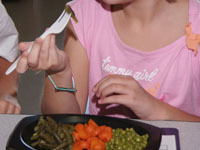Ice packs for children's school lunches should be priority for parents
 School starts in just a few weeks, and parents should be sure they keep their children's packed lunches safe.
School starts in just a few weeks, and parents should be sure they keep their children's packed lunches safe.
A study by a University of Texas in Austin doctoral student found fewer than 2 percent of the meats, dairy and vegetable products in more than 700 preschoolers' lunches were cool enough to be safe, says The Saginaw News.
The study included nine central Texas day care centers that care for children between the ages of 3 and 5. Most of the parents were married, and almost 90 percent of the parents had at least some post-secondary education, according to the study. Seventy percent of the families were white, 12 percent were Asian, 9 percent were Hispanic and 3 percent were black. Sixty percent of the parents were between 30 and 39 years old.
The researchers tested the temperature of individual perishable items from 705 lunches. They tested the foods 1.5 hours before the kids' scheduled lunch time because children are often allowed to start snacking on their food prior to lunch.
About 39 percent of the lunches had no ice packs, while 45 percent had just one ice pack.
Most of the lunches -- more than 88 percent -- were at room temperature, according to the study. Just 1.6 percent of perishable items were kept in the safe temperature zone recommended by the USDA. The USDA recommends that cold food be kept at less than 40 degrees Fahrenheit, and that no food should be at room temperature for more than two hours, informs USA Today.
According to his study, published in Pediatrics, some 705 lunches packed by parents for children in full-time daycare centers were checked for the temperature of perishable food items and the number of ice packs included.
The CDC says that perishable foods kept between 4 to 60 degrees Celsius (40 and 140 degrees Fahrenheit) for more than two hours are no longer safe to eat.
Some 39 percent of the lunches had no ice packs, while 45 percent had at least one. Some 12 percent were kept in refrigerators.
Still, 88.2 percent of lunches were at ambient temperatures.
"Even with multiple ice packs, the majority of lunch items were at unsafe temperatures," Almansour and colleagues wrote.
Almansour said the study had been an "eye-opener."
"It shows there is a problem," he added, recommending that lunches be packed with lots of ice packs and refrigerated once the children arrive at school, reports Reuters.
Subscribe to Pravda.Ru Telegram channel, Facebook, RSS!




